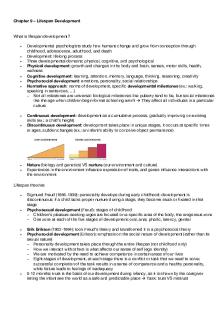Lifespan Development: Late Adulthood PDF

| Title | Lifespan Development: Late Adulthood |
|---|---|
| Course | Lifespan Developmental Psychology |
| Institution | University of North Florida |
| Pages | 3 |
| File Size | 93.1 KB |
| File Type | |
| Total Downloads | 35 |
| Total Views | 141 |
Summary
These are lecture notes, my professor was Dr. Rebecca Marcon. The topic of these notes are Physical Changes in Late Adulthood. I passed this class successfully but doing these notes and hopefully you can too, let me know if you have any questions!...
Description
Physical changes in late adulthood -over age 80, half of them can’t smell (more perfume) -temperature regulation is a problem (over the summer. house is too cold. Health in Later Adulthood (over 85) Limitations -not until 85 do more than 50% report limits on major activities (traveling, bathing one self) -people with higher incomes tend to be healthier and less health limits -rural residents have more chronic health conditions that limit their health activity -white Americans are healthier than black male Americans WHY? -access to education and health care -rural residents have a lack of access to medical care
Chronic Conditions -50% that limits activities is arthritis. -heart disease, 1/3 has hypertension, 10% in diabetes -Osteoarthritis- inflammation in the joints (knees and hips), DEVELOPS SLOWLY, AFFECTS JOINTS ON ONE SIDE OF THE BODY, USUALLY THE LARGER JOINTS, NOT A LOT OF MORNING SICKNESS/FATIGUE. PREVENTIONS? -exercise, eating healthy, maintain weight. Types: Rheumatoid: autoimmune (affects younger adult years and children, more unusual, has a hormonal and genetic component. Affects a lot of the joints, toes, fingers, affects both sides of the body, its systemic. Fatigue, warmness. Can shorter lifespan for about 10 years. Trigger: strep throat, high fevers. Mental Health -Dementia caused by brain impairment-irreversible- no medication can really help prevent it Alzheimer’s affects older adults –the synaptic and dendrite connections lose its function -before 65-genetic, after 65-more common, less genetic, expected to increase over time. Prognosis- 50% reduction in remaining expectancy TypesEarly Appearing- chromosomes 1,14,21 (before 65) Late OnSet-environment + chromosome 19 (after 65) Diagnosis Autopsy of brain tissue: they find the neurofibrillary tangles Living Diagnosis: Rule out other conditions: Neurological memory tests and Neuroimaging Medications can slow down the process but not prevent it. SYMPTOMS Earliest: forgetfulness Later: difficulty function in demanding jobs and social situations
Confusion and Helplessness Deficiencies in all cognitive and functional areas Unsteady in movements, loose psychomotor skills CAUSES Unknown but some possibilities Acetylcholine, no enough Excessive amount of aluminum (toxins) Brain lost capacity to synthesize proteins Brain induces by viral and environmental factors Parkinson’s- neurological component Cardiovascular Problems- strokes
Late Adulthood (Developmental Tasks) Developing point of view on death Evaluate goals and activates impt to you Accepting one’s life
Integrity and Despair (Psychosocial Theory: Erikson) Virtue: WISDOM Integrity; all live comes together Despair: to live life differently Life Review Questions: What kind of person I am? Am I satisfied with my life? Would I do anything differently? WISDOM (Two Views) ERIKSON- said wisdom involves three things 1. A wise person accepts the live they have lived without major regrets. 2. You Accept the imperfections in others and in one-self. (usually parents, accepts that nobody is perfect, not even mom or dad) 3. Accepting one’s death BALTES- sees it as a cognitive component, he thinks wisdom is rare. Wisdom- expect knowledge of fundamental pragmatics of life Pragmatics of life: knowledge and skills having to do with conduct, interpretation and meaning of life 1. Life is unpredictable 2. Its conditions vary greatly 3. People differ in values, goals and priorities 4. No one’s solution is best for everyone Successful Aging Many ways to live life successfully You disengage towards your last two years Retirement (7 STAGES)
-recent social phenomenon-lifespan process 1. Remote (while you’re working, you think of retirement in a positive way) 2. Near- thinking about a fantasy, traveling, a few years before 3. Honeymoon4.Disenchanment- your reality of retiring isn’t as fabulous as you thought. Our fantasy limits what we can do 5. Reorientation- you think of a new pathway, make something more on reality 6. Stability- you now have a relatively satisfying retirement, you’re stable 7. Termination- death, some people go bac to work, they’re bored, or they need money....
Similar Free PDFs

Late adulthood and death paper
- 6 Pages

Chapter 9 – Lifespan Development
- 13 Pages

Lifespan Development Powerpoint CLC
- 12 Pages

Lifespan Development notes
- 8 Pages
Popular Institutions
- Tinajero National High School - Annex
- Politeknik Caltex Riau
- Yokohama City University
- SGT University
- University of Al-Qadisiyah
- Divine Word College of Vigan
- Techniek College Rotterdam
- Universidade de Santiago
- Universiti Teknologi MARA Cawangan Johor Kampus Pasir Gudang
- Poltekkes Kemenkes Yogyakarta
- Baguio City National High School
- Colegio san marcos
- preparatoria uno
- Centro de Bachillerato Tecnológico Industrial y de Servicios No. 107
- Dalian Maritime University
- Quang Trung Secondary School
- Colegio Tecnológico en Informática
- Corporación Regional de Educación Superior
- Grupo CEDVA
- Dar Al Uloom University
- Centro de Estudios Preuniversitarios de la Universidad Nacional de Ingeniería
- 上智大学
- Aakash International School, Nuna Majara
- San Felipe Neri Catholic School
- Kang Chiao International School - New Taipei City
- Misamis Occidental National High School
- Institución Educativa Escuela Normal Juan Ladrilleros
- Kolehiyo ng Pantukan
- Batanes State College
- Instituto Continental
- Sekolah Menengah Kejuruan Kesehatan Kaltara (Tarakan)
- Colegio de La Inmaculada Concepcion - Cebu











